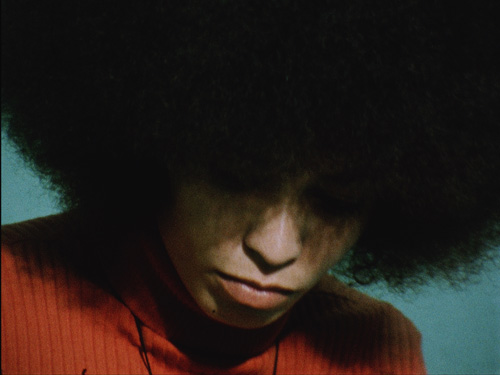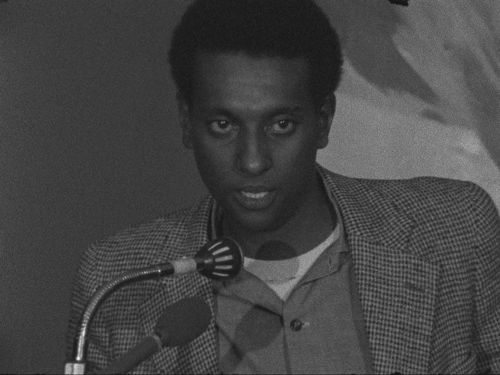Ahoy, squirts! Quint here. My first official screening at Sundance 2011 is the premiere of The Guard, but since I was in town I decided to hit up the press office early this afternoon and utilize their little screening cubby holes.
First of all, let me describe this process. You sign up for what’s essentially “Nexties!” on these little curtained off areas the size of a confessional booth. Against the wall is an HD TV, a DVD player, a chair and a pair of headphones. The fabric separating these screening cubby holes is thin, so the confessional image is complete since you can look to your left or right and see the vague shapes of others watching screeners.
I chose to watch a film called Black Power Mixtape 1967-1975. I knew it was a documentary, I knew the title and I knew the picture that accompanied it in the guide. I also knew I couldn’t make it to any of the fest screenings, so this was my shot.
Due to the title and the image in the guide (pictured below) I figured it was about the impact of black music on the civil rights movement. I am embarrassed that I did not recognize Angela Davis, but in my defense the afro does take up 90% of the photo.

Outside of a Jackson 5 song at the opening, music has little to do with this doc, which is a year by year documentation of the Black Power movement starting in 1967. I know that sounds like a hundred different documentaries, some brilliant, some dull, but the difference here is that there’s not one second of footage from modern day.
On top of it being completely vintage as far as the footage there’s another rather unique angle: the story is told by whiter than white Swedish documentarians who kind of stumbled into this movement and were granted amazing access.
They came to America in 1967 and noticed a blindness (either a willing blindness or ignorant blindness) in the white population of a small town. The film opens with an interview with a small deli owner who gives a nice, impassioned speech to the camera about how every American has a freedom seen nowhere else in the world, from freedom of speech to the ability to make something of himself, provided they aren’t lazy, of course.
They immediately contrast this with the poor part of this very same town as a young black woman is struggling to raise her children.
That sounds totally manipulative (and it is), but thankfully the main thrust of the documentary is on the grassroots rising of the Black Power movement, with a sharp focus on Stokely Carmichael, an activist who was kind of the middle ground between Martin Luther King Jr’s passive resistance and Malcolm X’s more violent rhetoric.
At its best this documentary really highlights the point of view of the leaders of the Black Panthers and other Black Power groups, especially in the early days. We hear stories from those that were there, we see a real time slice of life for the working poor Black family, we see the horrible daily fight for some semblance of dignity and progress.
And it is at its best for a good long while. It’s not until the last act that things begin to drag, but that’s really not the filmmaker’s faults. The movement changes, the leaders are no longer the peaceful voices, like Dr. King, or the righteously angry “I’m mad as hell and I’m not gonna take it anymore!” voices like Malcolm X and Stokely Carmichael, but the fanatical voices like Lewis Farrakhan. We see an early ‘70s interview with Farrakhan that was scarier to me than any Black Panther “hunt the pig” chant shown in the hour before. The dude had crazy in his eyes and was certain that the white man is the devil and forcing dirty pork on society. Crazy shit.
I mean, we are the devil, but bacon is delicious. That was a gift!
But everything before was brilliant and surprisingly varied, showcasing everything from Harry Bellafonte’s travels with MLK, Dr. King’s assassination, the beginning of the Black Panther movement, Attica, Vietnam, Angela Davis’s multiple trials and a surprisingly intimate look at Stokely Carmichael. In fact some of my favorite stuff involved Stokely interviewing his mother, a light personal moment of such a inflammatory figure.

Second only to Stokely, Angela Davis’ wrongful persecution provided much of the narrative. Davis was tied to a shooting at a speaking event and even though she had nothing to do with the shooting, an example was being made on this outspoken civil rights activist. She was jailed for nearly 2 years as her trial date kept being moved and pushed before she was rightfully acquitted.
In order to frame a narrative they have different speakers narrate over certain sections, everybody from Bellafonte talking about Dr. King, accompanying silent footage of the two in a meeting with the King of Sweden, Erika Badhu, John Forte, Angela Davis herself (which is particularly enlightening considering how she’s practically the heart of the documentary), Melvin Van Peebles, Robin Kelley and Talib Kweli.
So, final verdict is this flick is quite an eye-opener that puts a human face on what most view as ancient history and a shocking perspective on how we’re still in the same cycle politically. Times have undoubtedly improved, but it’s shocking how much is still the same. Discrimination is still out there and I can’t help but think if we’re going to see a similar documentary about gay rights 40 years from now.
I’ll be back with more Sundance coverage very, very shortly. If you want an up to the minute account of what I’m seeing and my immediate verdict on Sundance flicks as I see them be sure to follow me on Twitter!
-Quint
quint@aintitcool.com
Follow Me On Twitter

